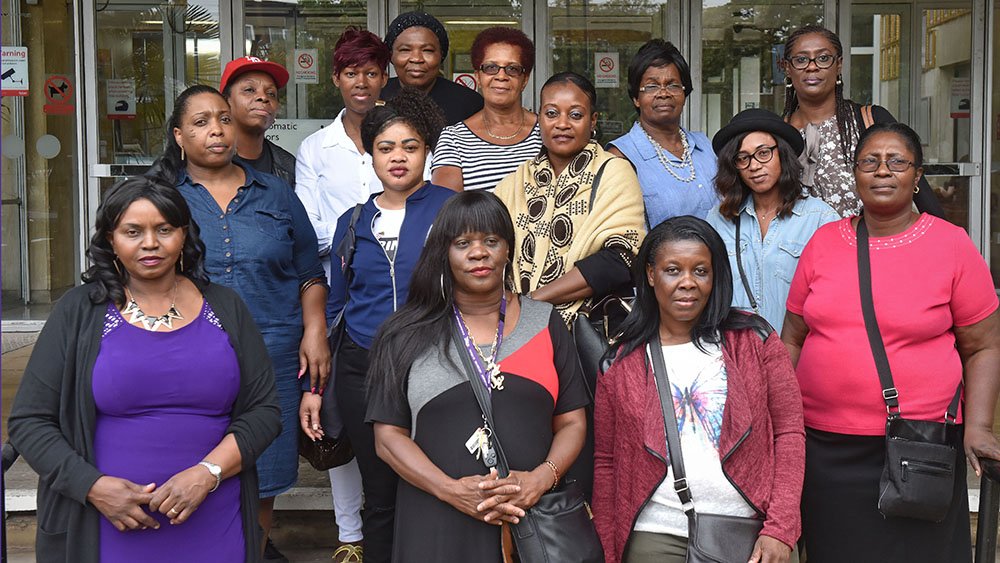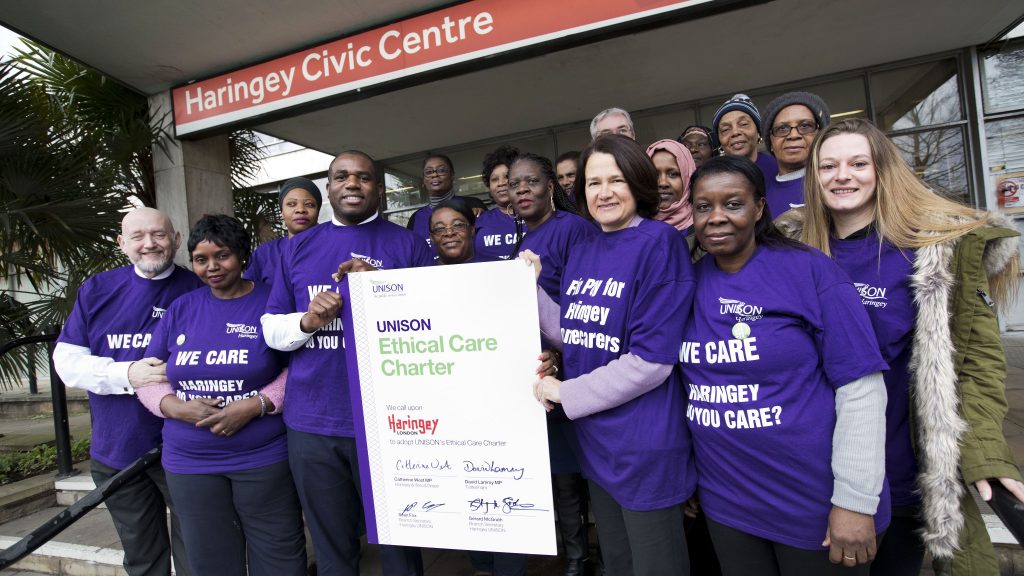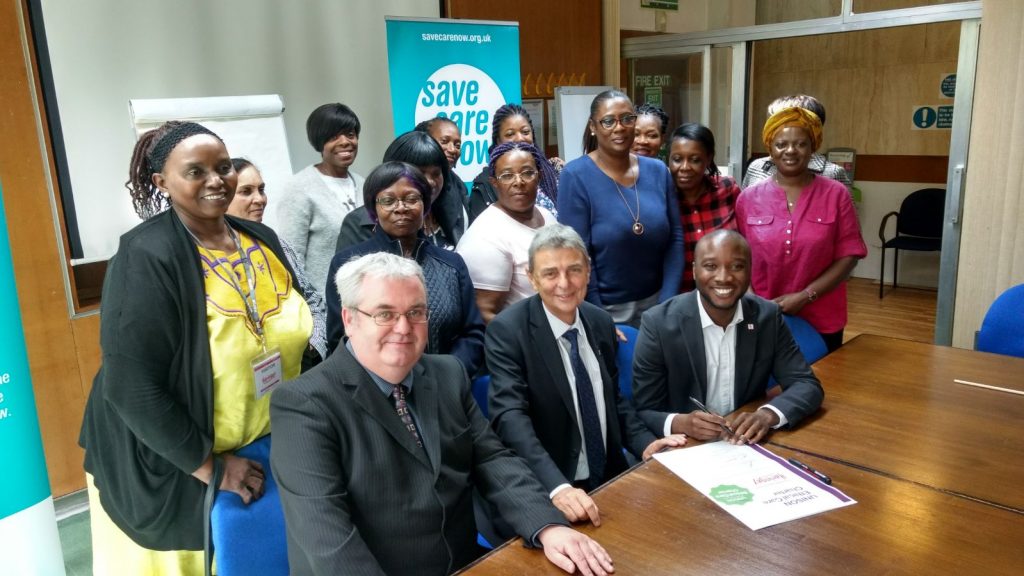Brilliant teamwork between branch officers and UNISON’s legal team, over a period of four years, has won UNISON one of its most significant recent victories – which will improve the fortunes of thousands of exploited homecare workers all over the country.
The employment tribunal judgement over the national minimum wage case is also thanks to the courage of 10 homecare workers who were willing to stick their heads above the parapet in order to fight for their rights.
As UNISON general secretary Dave Prentis puts it: “This is a major victory for these dedicated workers who dared take on their employers. Their long struggle is nothing short of heroic.
“It’s time the skills and experience of care staff were respected, instead of them being underpaid and undervalued. The pandemic has proven just how vital they are in looking after the sick and elderly, the most vulnerable in our society, and keeping the care system running.”
In short: the employment tribunal accepted that contractors commissioned by Haringey Council in North London breached the National Minimum Wage Act by paying some care staff less than the minimum wage.
The claimants – the majority of whom are Black women – will now receive an average settlement of around £10,000 each in backdated earnings.
The judgment acknowledged UNISON’s claim that travelling and waiting time of up to 60 minutes between appointments should be treated as working time and paid at the minimum wage. This will now provide other homecare staff with a clear method of calculating how much they are owed.
Smelling a rat
But it was a long and arduous journey to get to this ruling, requiring resolve, creativity and hundreds of hours of old-fashioned graft.
It started in 2016, when UNISON’s Haringey local government branch started to investigate how Sevacare, which then managed the council’s homecare contracts, was paying its homecarers. And a canny former branch officer, Patrick Fleming, used section 10 of the Minimum Wage Act to access the company’s pay records.

Patrick Fleming at a homecare workers briefing ©Marcus Rose
Joint branch secretary Sean Fox recalls: “At first we just suspected there was a problem. But once we started digging, looking at people’s timesheets, it became obvious very quickly that something was wrong.”
What they found was local evidence of a national issue UNISON has long been campaigning against: the non-payment of homecare workers’ travel time between clients, and for the time they might have to wait in between appointments.
As a result, while a company can claim it pays an hourly rate in accordance with the minimum wage, by not paying for those hours the actual rate is effectively lowered. Dramatically.
“It was all about the gaps,” says Sean. “A person might be given three hours of care work a day, but be travelling for hours more, or just waiting. By the time you calculate the pay against the actual hours they’ve worked in a day, it could be as little as £3.27 an hour.”
The minimum wage in 2016 was £7.20.
The lawyers
At the same time as Patrick Fleming was studying timesheets, the issue was also being addressed at UNISON Centre in London. Kate Ewing, who was then a legal officer with UNISON’s in-house legal team, picks up the story.
“I was working with [national officer] Matthew Egan on the issue of care workers and National Minimum Wage non-compliance. We identified there was a need to take action and together we hashed out a strategy to go after big care companies. Matthew provided the sector knowledge and I provided the legal.
“I worked out that part of the problem was no one was able or willing to put in the graft of going through the timesheets. But if we did, the employers would be exposed.
“It was then that Patrick Fleming got in touch. And it became apparent to me that that he had some key things that our strategy needed – members, working for a big company, who were seeking advice.”

Kate Ewing, standing third from right, with members of UNISON’s legal team ©Ralph Hodgson
Kate and Matthew Egan went to Haringey to meet Patrick and some core members, including a number of the eventual 10 claimants. “It was a meeting I will never forget,” she says. “We explained that we had this idea, but it would be hard and there were no guarantees. They would be taking risks.
“We pointed out they were a group and that was unusual and could give them strength. We stepped outside, so the members could decide what they wanted to do. It had to be their choice. The moment we were summoned back in was fantastic – they told us, ‘We want to do this’.”
Matters came to a head when the council suddenly had to re-tender its homecare contracts, because Sevacare was pulling out. UNISON now launched its legal case.

Ben Patrick, another of UNISON’s legal officers who was heavily involved, sums up what was at stake. “For the members, it was an incredible amount of money. For the union, the case was part of a campaign to expose widespread National Minimum Wage breaches across an entire industry, which employs many tens of thousands of people.
“Homecare workers are all on zero-hours contracts. They are the most lowly-paid workers, virtually all Black, and mostly women. And they’re being ripped off.”
The claim was for repayment of unpaid wages over a period of two years, which is the maximum period permitted by law. The chief reason it took four years to be judged, was the tussle between companies over responsibility for the underpayment.
The three companies that faced the Employment Tribunal in September – Kaamil Education Limited, Diligent Care Services Limited and Premier Carewaiting Limited – inherited liabilities under the National Minimum Wage Act from Sevacare, because of TUPE transfers.
While that liability was being debated, UNISON had to make the case for underpayment.
It was a mammoth exercise, going through all these timesheets
Says Ben Patrick: “It’s a very simple idea – you’ve got a homecare worker who’s on the road, typically from 6 o’clock in the morning to 8 o’clock at night, with various appointments, then gaps in between when they’re not paid. But the mechanics of actually proving that are extremely time-consuming and complicated.
“Our case was based on a sample period of eight weeks during the two years. We had to go through each claimant’s timesheets for those eight weeks, their appointments, the postcode of each appointment, their method of transport – walking, public transport or driving – then went to Google Maps and Citymapper to calculate the time it took to make each journey. And we put those figures into an Excel spreadsheet.
“It was a mammoth exercise, going through all these timesheets, line after line. And some of these workers had 10 or 12 appointments a day, six days a week.”
The strategy was conceived by Kate Ewing and supported and resourced by Adam Creme, UNISON’s director of legal services. Ben took over the lead role when Kate left the union; he was helped by different assistant legal officers over the years, most recently Kate Douch, who until the end of 2019 spent hours over the calculations. In the final stretch, he was working alone.
The aim of their painstaking work was to devise a methodology for the correct payment of travel and waiting time – which concludes that ‘gaps’ between clients of up to one hour must be paid.

In solidarity: Haringey homecare workers
Meanwhile, back at the branch, recruitment and representation officer Liam O’Donohue had taken over the case from Patrick Fleming and was now liaising with the 10 claimants. Like most people, they were unfamiliar with the labyrinthine complications of the law – so were understandably wondering what was taking so long.
“I think it’s fair to say that they were getting frustrated,” Liam smiles. “I was trying to understand myself why the companies were digging their heels in, from a legal perspective, and explain that to them.
“My job was mainly to keep them engaged in the process. We would get them together in the Civic Centre in Haringey, where we work, every few months, and give them a presentation that would update them on the progress of the case.
“And it was heart-breaking, really, listening to how difficult their lives were, these people who are exploited to such a horrible degree. When people ring you up and tell you that they can’t pay the bills, they’ve got kids to feed, kids to clothe, it makes you upset and angry at the unfairness of it.
“They’re out there caring for people – they could be out there caring for my grandma – yet they’re being treated so badly.”
My hope is the decision will help other homecare workers receive the same justice
When the tribunal ruling came, the members’ average pay-out was, by UNISON’s calculation, equivalent to nine month’s work and annual leave.
Significantly, the judge also recorded – and made public – the union’s methodology. This has implications for thousands more care staff around the country, arming them with a clear method of calculating how much they are owed.
Among the Haringey workers, Louise Jones* was travelling between up to 15 clients a day, sometimes starting at 7am and ending at 9pm – but not getting paid for the time she spent driving between appointments.
“It’s been a long fight, but it’s great the case has come good in the end,” she says.
“My hope is the decision will help other homecare workers receive the same justice. I love my work – I like to help people and see them happy, especially those who are vulnerable. I worked every day through the pandemic, which wasn’t easy, but it’s a vital job.”
Care workers aren’t valued. We’ve been treated like we were nobody
Jess Williams* also works long days and has to travel by bus or walk to see the people she looks after.
“People think the job just involves giving out tablets or a cup of tea. But you have to be a doctor, nurse and social worker. It’s a huge responsibility – you could be looking after someone in pain or distress,” she says.
“Care workers aren’t valued. We’ve been treated like we were nobody. That’s why this result is so important, not just for us but others like us. It’s been daunting bringing this case. But I believe in justice and we supported one another to the end.”
Behind the scenes – towards a living wage
And their patience and perseverance has resulted in another development in Haringey, an icing on the cake for all its homecare workers.
While the employment tribunal case was ongoing, Sean Fox used it as political leverage in persuading the council to sign UNISON’s Ethical Care Charter.
“The case was the thing that got them talking to us, because obviously it was highly embarrassing for them,” he says. “And we were bringing some of the homecarers along to meetings with the councillors. Most of them live in the borough, so they’re also voters!”

Local Labour MPs David Lammy and Catherine West backed the Ethical Care Charter campaign. ©Jess Hurd
The chief effect of the charter will be seen this October, when the council will ensure that everyone providing homecare in the borough is paid the London Living Wage – with the stipulation written into its homecare contracts, all of which are currently being renegotiated.
The charter also guarantees payment for travel time. And Sean says that the council is making providers aware that they must not fall foul of the new judgement.
“These claims were obviously a small sample,” he says. “What we really needed was the council to move away from the model it was using to deliver homecare – which was a mess, frankly, and allowed all the abuses that were leading to these claims.
“The work we’ve done with the council has been an important step in ensuring that all of the providers, not just the ones where we have members, are doing the right thing.”
No excuses
Nationally, UNISON has outlined a number of demands to government, including an end to zero-hours contracts. The union’s call for a national care service would help prevent illegal pay practices.
And following on from the Haringey judgment, UNISON Bargaining Support has updated its national minimum wage guidance.
Gavin Edwards, acting senior national officer (social care) observes: “UNISON has always said there is no excuse for refusing to pay care workers for travel time, and this judgment confirms our view. Every employer in the social care sector should be looking at this and making sure they have their house in order.
“UNISON is advising our branches and reps to challenge employers who are refusing to pay for travel time and has issued guidance on the steps they should take to do this. UNISON is the union of social care, and we will not tolerate our members’ employment rights being violated.”

Seated l-r: Sean Fox, Dave Prentis and Haringey Councillor Jason Arthur were joined by members for the Charter’s signing ceremony
With the case over, Ben Patrick is now looking ahead to giving evidence to the Low Pay Commission, which has been taking a keen interest in the claim throughout.
“Our claimants have been extremely courageous and patient,” he says. “But this case was always much bigger than those homecare workers. We wanted to improve pay and working conditions for everybody.”
Shantha David, UNISON’s acting head of legal, adds: “Ultimately, we’re campaigning lawyers. We wanted this to go to tribunal, we wanted there to be a decision, we wanted the members to have their day in court and publicise this, so that employers don’t do this sort of thing again.
“The best part of the decision was the judge recording the methodology of calculation. So if employers say, ‘We don’t know what to do’, there is now a guide we can point them to.”
She asserts with some pride that, “No law firm would have touched this, because it was so labour intensive, given the amount of detail Ben, Kate Ewing and Kate Douch had to achieve to make the case happen.
“It is a testament to Ben’s dedication to this case that he pressed the tribunal to hear it, despite COVID restrictions and the employers’ many attempts to stop it happening. It’s been a lot grittier than most cases, a lot harder to bring, members’ livelihoods were on the line. So it’s quite an emotional victory.”
Despite having left the union two years ago, Kate Ewing has also watched this victory with enormous satisfaction. “I care so much about this case. It was a huge responsibility that we owed the members, and I am so happy that they have received at least some of the recognition and justice that they deserve.
“It is a case which typifies the best of trade union empowerment of workers.”
* Jess and Louise are aliases

